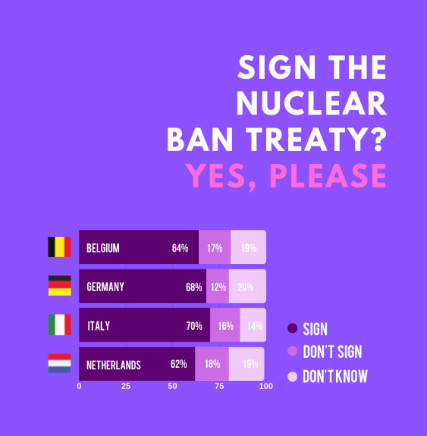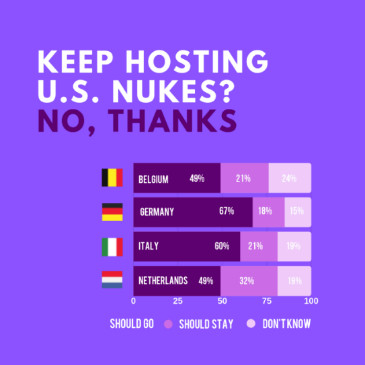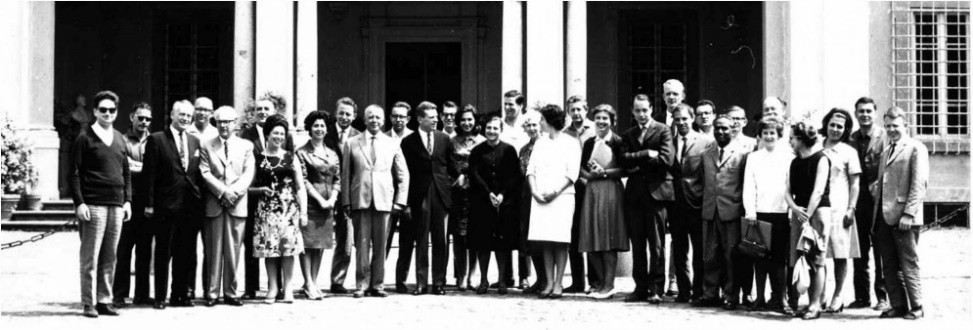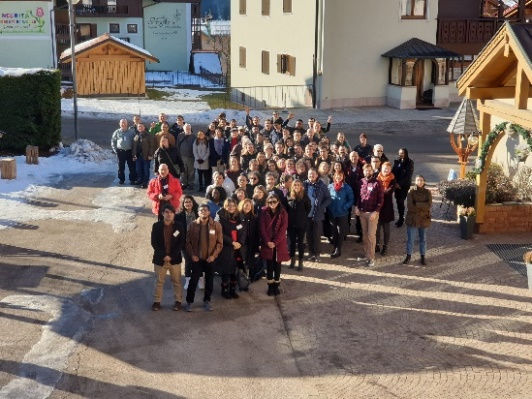
After an intense political debate (L. Nuti, La sfida nucleare 2007) Italy joined the Nuclear Non- Proliferation Treaty, concluding the ratification process in 1975, as a non-nuclear country. Despite this status, Italy – like four other NATO countries – has hosted American tactical nuclear weapons since the 1950s, according to the principle of “nuclear sharing”. Currently, the number of US nuclear weapons deployed on Italian soil is about 40 (in two different bases in the North of the country: Ghedi and Aviano), being Italy second just after the number of US nuclear weapons hosted by Turkey under NATO nuclear sharing agreements (H. M. Kristensen & M. Korda, BAS 2019).

The attitude of Italian public opinion – especially after the end of the Cold War – has gone in the direction of rethinking the deployment of such armaments on Italian soil. From recent surveys it is possible to analyze the position of Italian public opinion with respect to the nuclear weapons still hosted on Italian territory. From a survey commissioned by ICAN (2019), we can see how the European countries that host US nuclear weapons would prefer to rethink the nuclear sharing agreements, and Italy appears – after Germany – the second country in which the majority (60%) of citizens think that US nuclear weapons should be removed from their region.
Concerning another issue that has interested civil society since the beginning of the 21st century, as can be seen from the same survey, among the countries hosting US nuclear weapons, Italy is the country with the highest percentage (70 %) of people in favor of the new Treaty on the Prohibition of Nuclear Weapons (TPNW), believing that the government should sign it. Even higher percentages emerge from another survey commissioned by Greenpeace (2020), in which 79% of those interviewed would be in favor of the dismantling of the global nuclear arsenal and of the withdrawing of the atomic warheads housed in Italy. In the same 2020, another ICAN poll confirms a 74% majority of Italians towards a hypothetical withdrawal of American nuclear weapons from its territory; it’s important to underline also that the majority of interviewed citizens is even not aware about the presence of US nuclear weapons deployed on Italian soil (among others: M. Durin’s blog Il Disarmante Jozef – Per un mondo libero dalle armi nucleari).
A political sign toward the support of the 2017 TPNW has been the advocacy by two high level Italian politicians (Franco Frattini, former Minister of Foreign Affair and Vice-President of the European Commission; and Enrico Letta, former Prime Minister) of an international open letter of former Officials of Nuclear-Dependent Nations, coordinated by ICAN in support of the Treaty (2020 Open Letter in support of TPNW). From another side, in May 2022 the Italian Association of Epidemiology (AIE-Peace Working group) issued an open statement addressed to the Italian Government on “the urgency of protecting Italy and the world from the nuclear threat and the priority of adhering to the TPNW” (AIE Open letter on TPNW). As for the Italian Parliament, few interest can be detected from its side. It is worth mentioning in this sense a Parliamentary Resolution discussed (21 April 2022) by the Permanent Commission III “Affari esteri e comunitari”) due to member of Parliament Laura Boldrini’s initiative Ris. Boldrini (2022) Sull’impegno dell’Italia a favore del disarmo nucleare. Underlining the current stalemate of the Non Proliferation Treaty, the proposed resolution suggested that Italy looked with interest at the new treaty, but it met with various political oppositions, in the tense international context which followed the 2022 Russian invasion of Ukraine.
At national level, the main associations historically committed to arms control since the Cold War era, are probably ISODARCO, the International School on Disarmament and Research on Conflict (established by the Italian Pugwash group), which organizes residential courses on these issues) and the Union of Scientists for Disarmament (USPID). In particular, the USPID issued a document in May 2008 in which it supported the 2007 bipartisan initiative of the four American statesmen, and declared obsolete the role that NATO had assigned to tactical nuclear weapons deployed on European territory, calling for the total withdrawal of such weapons from the European context. A few years later, the association USPID drafted a new document in 2021 (“Time to withdraw US Nuclear Weapons deployed in Europe”) in which it reiterated the concepts of the previous document, strengthened by the news of the TPNW, which – according to USPID – could represent a new window of opportunity to move in the direction of disarmament. In 2022, a network of associations for peace and disarmament (made up of Campagna Senzatomica and Rete Italiana Pace e Disarmo) campaigned for Italian membership of the TPNW, promoting the simultaneous renounce of nuclear weapons based on its own territory (campaign “Italia, ripensaci”). These documents have received almost no attention in Italian political circles so far.

